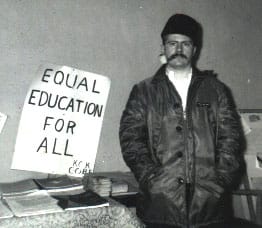Links to consider

Concern for freedom of speech and of the press had historically been a monopoly of liberals and leftists — until they began to acquire influence and power, especially in academia. Beginning in the late 1970s I found myself having the same arguments about freedom of expression with liberal and leftist friends that I had with conservatives and right-wingers only ten years previously. Instead of the subversive and anti-American speech conservatives were worried about, we now had issues of “insensitivity” and opposition to progressive causes and crusades to suppress.
I feel we have far less to worry about when all points of view are heard and vigorous debate and examination are encouraged. Any belief system, cause or crusade that cannot abide opposition and criticism is dangerous if only on that account. In each case, advocates intuitively know that the special interests served by the cause or crusade are at risk in an open system. To allow criticism is to risk all, and when “all” is some wonderful abstraction — whether its patriotism and nationalism on the one hand, or social causes and crusades on the other — that gives meaning to otherwise banal lives, the compulsion toward repression is very strong. After all, why give the enemies of righteousness a weapon?
The reason why is to curb excesses, to provide a system of checks and balances, to revise existing policies in view of new facts or circumstances, to expose hidden agendas and harmful motives, and to prevent intolerant political systems. Freedom of expression is the self-correcting mechanism of a free society.
Although each comes from different perspectives, these web links are playing an important role in maintaining the freedoms we need to preserve.

- THE WILCOX COLLECTION OF CONTEMPORARY POLITICAL MOVEMENTS. One of the largest assemblages of left and right wing U.S. materials anywhere. There are thousands and thousands of pamphlets, books, newsletters, audio recordings, and political ephemera such as bumper stickers, posters, flyers, organizational membership mailings, book catalogs, relating to some 10,000 organizations at the fringes of the political spectrum.
- CENTER FOR DEMOCRACY AND TECHNOLOGY. Another organization opposing censorship in the internet and other related issues of modern technology.
- FIRST AMENDMENT CYBER-TRIBUNE. An online magazine dealing with issues of censorship, freedom of speech, freedom of religion, individual liberty and related issues.
- NATIONAL ASSOCIATION OF SCHOLARS. A frankly neo-conservative group with a special interest in opposing political correctness and censorship on the campus. Also opposes affirmative action and race-based admissions.
- FORFEITURE ENDANGERS AMERICAN RIGHTS. Opposed to forfeiture of property prior to any finding of guilt or responsibility. The abuses of law enforcement forfeiture of property are widely know. If you are stopped by police with as little as $500 cash on you, it can be confiscated until you can explain how you happened to have it.
- ELECTRONIC PRIVACY INFORMATION CENTER. Champions the right of internet users to enjoy their privacy. Opposes FBI plans to turn each cell phone into a tracking device.
- AMERICAN CIVIL LIBERTIES UNION. I have been an ACLU member since 1959 when I joined at the age of sixteen in Pittsburgh, PA. The ACLU has changed since then and has gone from a conscientious “liberal” organization to the legal arm of a number of leftist causes and crusades. Nevertheless, the ACLU maintains a good record on freedom of expression issues and I remain a member for that reason alone.
- AMNESTY INTERNATIONAL. Most “human rights” groups are actually political lobbying operations on behalf of this or that class of victims. Nevertheless, Amnesty International has the most responsible and balanced approach I know of. I have been a member for about 15 years now and I help with their anti-death penalty program.
- ELECTRONIC FREEDOM FOUNDATION. Censorship on the internet is the primary concern of this group. They have opposed legislation to censor internet content and are in the forefront of electronic freedom of expression.
- CENTER FOR INDIVIDUAL RIGHTS. A growing neo-conservative organization dedicated to fighting political correctness and censorship on the campus, reverse racism in the form of affirmative action, and preferential admissions to colleges and universities.
- FAKE HATE CRIMES. A site that compiles a comprehensive database of the false reports of “hate crimes” committed (mostly) in the USA. It builds on the work of Laird Wilcox, whose Crying Wolf is the original book on this subject. Hate Crime Hoax by Professor Wilfred Reilly also adds to Wilcox’s work.
- WATCHING THE WATCHDOGS. A blog containing up-to-date information on the “hate industry.”